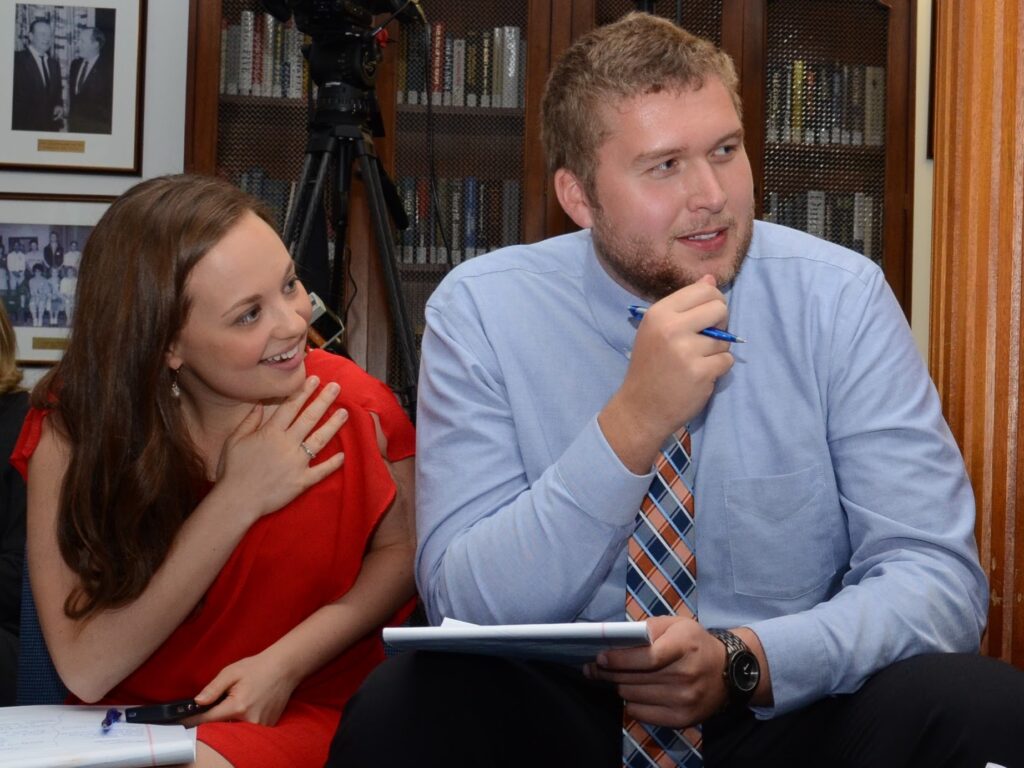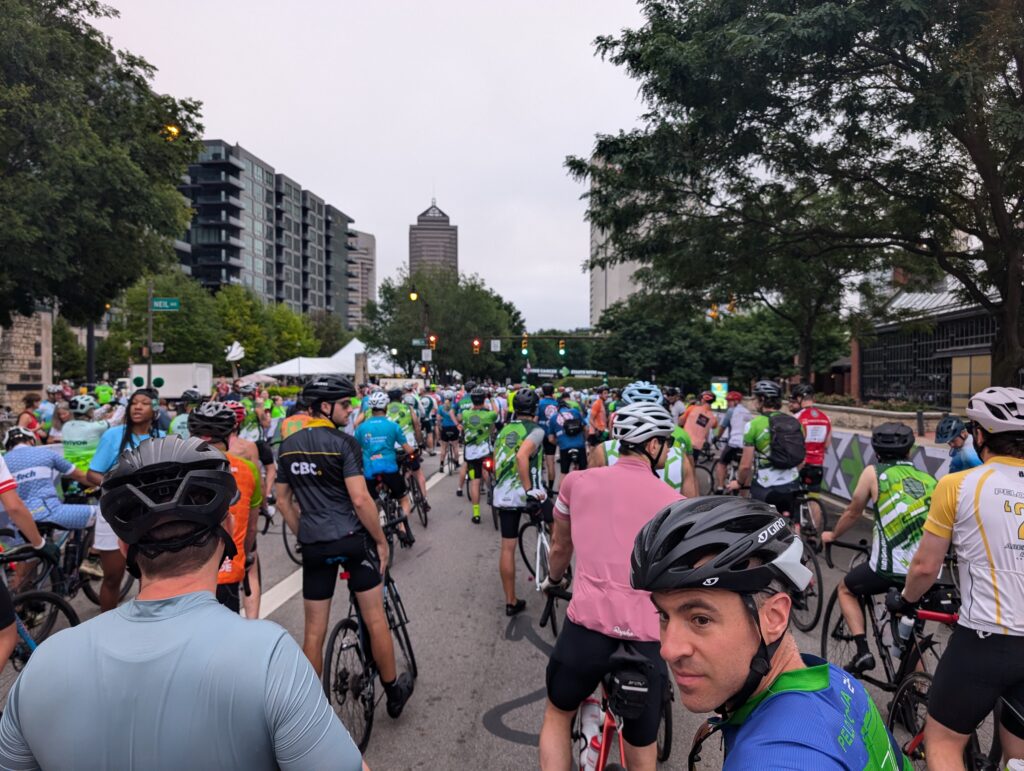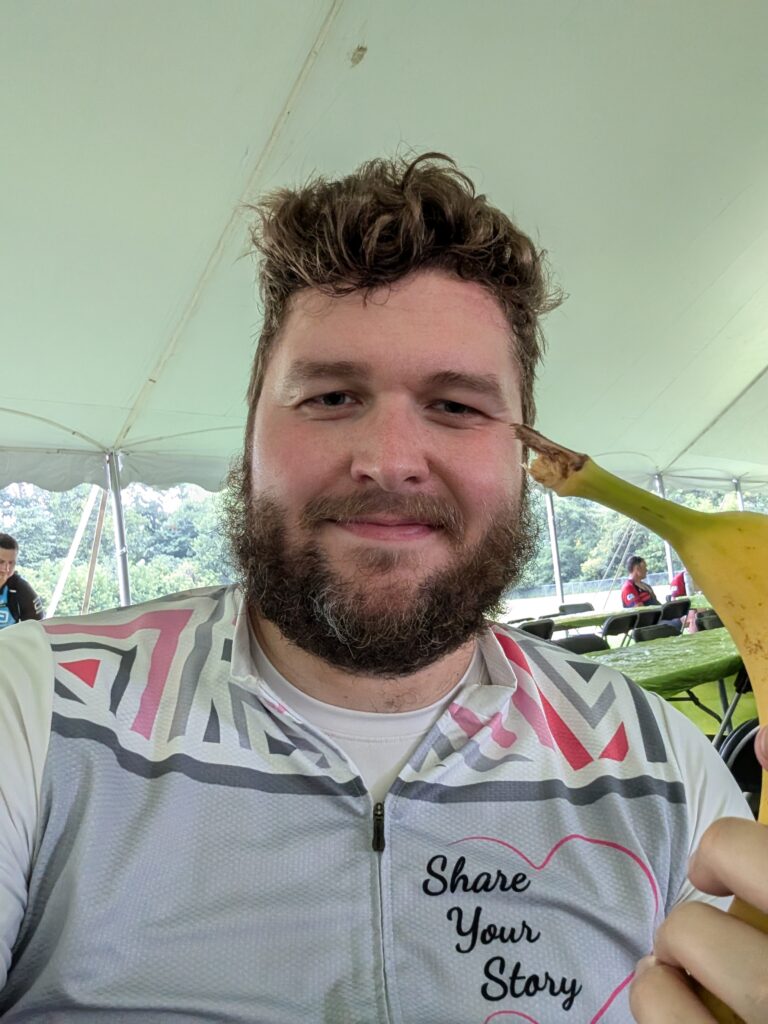Good Work in Halle's Memory
Ashbrook has been around for more than 40 years, and we have nearly 700 alumni in our network. Our alumni are doing some good and interesting things, and we would like to share some of their stories with you.
I recently had the chance to chat with Alec Temple. Alec met his wife Halle at Ashbrook. Halle had cancer as a child and relapsed after she graduated. Sadly, Halle passed away in 2020. Alec now does work with some charities and even started a foundation in Halle’s memory to help families who are in Columbus for cancer treatment.
Where are you from and how did you end up at Ashbrook? I am from Wapakoneta, Ohio. When I was finishing high school and thinking about what I wanted to learn in college, the idea of understanding how people tick and how their brains work—how they think—was really interesting to me. I was looking into philosophy and political science programs, and I was also interested in economics.
I came to Ashland and toured the Ashbrook Center, and was fortunate to be one of the last students who got to have that interesting meeting with Dr. Schramm. After that meeting I thought that if these are the kinds of things I want to learn, I need to be in a place with this kind of professor. I was really interested in the way Ashbrook did classes—that you could develop your own thoughts.
What year did you start at Ashbrook? 2014

Tell me about meeting Halle. We met on the first day of Ashbrook Bootcamp. We all come in as freshmen trying to find a relationship—all these new people are around. I was sitting in the back of one of the classes, and I noticed Halle had this promise ring on, but I didn’t know it was a promise ring. It had this giant pearl on it, and from where I was sitting, I thought it was an engagement ring. I found out quickly that she wasn’t engaged.
About a month into the first semester I was doing laundry on the third floor of Andrews and Halle was working on a paper in the laundry room. And we just got to talking. When she was a child, she had cancer in her left shoulder and elbow region and she had to have another bone put into her arm. There was a huge scar on her arm from that procedure. At the time, I didn’t know that, so I asked her if it was okay if I asked about her scar. She got this huge smile on her face and just opened up about it, and said, “I absolutely love talking about this.” She felt that her cancer journey from when she was 6 until she was about 14 was an opportunity to share her faith and the journey she felt God walked her through.
That was so honest. I wasn’t really ready for it. It was so inspiring. This is a person that is just so refreshing—such an optimistic person. Something awful happened to her as a child and was something she always had to deal with, and it didn’t matter. She thought it was a bad thing that she got to use for good.
We started hanging out more after that and started dating maybe a month later. We dated throughout all four years at Ashland, got engaged during our senior year, and got married about a year after.
When did Halle’s cancer return? It was in May of 2018, after we graduated, that she relapsed and she began treatment on June 1, 2018. She had a couple masses in her back. One was a little bit closer to her lung and one closer to her hip. It was that second one that alerted them that the cancer was back. It was pushing on a nerve in her back, and she collapsed one day. She was at the Cleveland Clinic for a couple weeks, but had some connections in Columbus.
She had interned at Pelotonia the summer of 2017. It is a small team of 20-25 people, and she had made some good connections there. So we had reached out to them and asked if they knew anyone so we could maybe move her treatment to Columbus.
What is Pelotonia? It is a bike ride that happens in Columbus that sponsors cancer research at The James. 100% of anything that is donated to the riders or the volunteers goes directly to The James.

So they helped with getting her moved to Columbus? The President and CEO of Pelotonia knew one of the top researchers for Ewing’s Sarcoma at Nationwide Children’s Hospital, and so we got a consultation with him. About two weeks or so after the diagnosis she was moved to Nationwide Children’s Hospital. She was in Columbus for three or four months to have some surgeries to remove some of the masses and to relearn how to walk. After that she was able to go home and work through her chemo therapies until May of 2019.
When did you guys get married? We got married in June of 2019. Halle moved to Columbus and we lived in the Dublin area.
At this point, she was in remission, right? We were thinking that she was good. We had one set of scans that summer, and it was good. In October we had another set of scans that showed other pockets of sarcoma that were starting to come back, so she was declared to be relapsed again. Ewing’s Sarcoma is tough, because any relapses after the first one has pretty much a non-existent success rate for treatment—the body adjusts to the treatment and it stops being effective as the cancer cells come back. So we tried to work through some experimental stuff, but each time we tried something, a new problem came up and we would have to stop the treatments. In April of 2020 the ball of her femur that goes into her hip broke, so we had to stop the treatments—there wasn’t anything they could do for the cancer while they were addressing the bone. The cancer had spread so much that there wasn’t much they could do, and she passed in May of 2020.
How did you get involved with Pelotonia? My Pelotonia journey began when Halle interned there in 2017. We both thought this was an excellent organization. The way that they run it is the way I would like to run my non-profit. They have a very giving spirit and understand that it is about more than the work they are doing—there is a bigger purpose to what they are trying to accomplish. It was a place that she wanted to work after graduation, but because of how things went it didn’t work out. When she had her relapse on a Thursday or Friday, I stopped by the Pelotonia office on my way to the Cleveland Clinic, because some of the people had some things they wanted to give her. They had this huge care package for her of very thoughtful items. Their overwhelming support for the people they care about is second to none. The way her treatments worked once they were moved to Columbus required about a week of treatment at a time. Each day of the treatment week was full. Halle lived about 2 hours from Columbus, so they would have to drive 2 hours, undergo 7 hours or more of treatment, and drive 2 hours back—each day for a week. Once the people at Pelotonia heard about this, a couple of them with Airbnbs offered their properties free of charge whenever she was in town for treatment so she wouldn’t need to make that commute. It was this kind of generosity that made me want to give back.
In 2019 when she was in remission I decided to ride for the first time, because this was an organization and cause that Halle really cared about. I did 25 miles on a super old mountain bike that I shouldn’t have been riding and it broke down during the middle of the ride. It was still a chance for me to show my support and get plugged into this community that had given so much to us. I have ridden ever since. In 2020 everyone kind of did their own thing. I did 100 miles in 2021. In 2022 I did my first 2 day ride of 160 miles. Last year was my first year doing the full ride of 184 miles. And this year I did the full thing again, which was 190 miles. These last two years I have been able to volunteer as well. They have a lot of great volunteer opportunities all weekend.
Tell me a bit about starting Share Your Story. Share Your Story is a non-profit foundation aimed at meeting the needs of families that have been affected by cancer. We believe that there are a ton of great organizations that are raising money for cancer research or raising money for scholarships so people can go to school to study this. We feel called to come alongside the people who are going through cancer and help them fill all of the sudden gaps that you realize you have when you are going through cancer treatment. When you receive a cancer diagnosis, there are the primary griefs that you have—the realization that you have cancer and the changes to your life that come with that. Then there are the secondary griefs that come from realizing that your work has to change, you may be in a city that you don’t know for treatment, you don’t have a place to stay during the treatments, you don’t know what to do about food, you don’t know if you have connections. So we aim to be that stop gap. One of the biggest needs we meet is housing for families who are coming to Columbus for treatment for intermediate to long stays. We have apartments across from Nationwide Children’s. We opened our first one in April 2022, our second in June of 2023, and we are working on our third one. So far we have housed ten families with an average stay of somewhere around six months. They can come and stay as long as they are receiving primary cancer treatments. We also have other resources available. We have connected with food pantries and resources for them to get clothing. The first family to stay in our second unit was from Gambia. They had no winter clothing—they didn’t need it before coming to Columbus, which was fine in June and July but was another story as the weather changed. It was great to be able to help them get the clothing that they needed to get back and forth to the hospital.
We are also launching a pajama line specifically designed with the cancer patient in mind. For instance, if they have a port near their collarbone and they don’t want to take their gown off and be cold, we put snaps near the neck so they can open it up a little bit for access to the port, but their whole body is still covered and warm. We stripped the metal out of the pajamas so they can wear them for an x-ray or an MRI. The snaps are also designed to be opened using just one hand. In some of the sweatshirts we designed there is a zipper in the forearm so they have access for blood draws. We have positive messaging on them. We have several different designs available. This is especially important for kids, because they feel like all of their choices have been taken away when they are undergoing cancer treatment—they have to be at the hospital at this time, they have to be poked and prodded, they have to go through this terrifying thing. Just giving them some choices on a small thing is huge for them. These first couple of things were something that Halle had talked about wanting to do. Pretty much from her first treatment she had wanted to do pajamas. She was really into fashion, and she had these ideas of how she could make the gowns better. After she had her first relapse, Halle and I had talked about wanting to do the housing. We thought it would be something we could do when we were old and rich, but it just became a reality with the support and interest of people around us. Some family and friends encouraged us to do some of these things she wanted to do in Halle’s memory. It has been a blessing in my life to be able to help people in these ways.

How can people get involved or support Pelotonia and Share Your Story? You can get involved in Pelotonia and SYS in a couple of ways.
Pelotonia: Every year there is a ride the first weekend in August, and there is a Gravel Day ride sometime in the fall. The Ride is probably their #1 way to get involved, as you raise money for cancer research as part of the ride. 100% of that money goes to The James at OSU. You can also volunteer for their events, and there is not a fundraising commitment to volunteering. You can still raise funds individually or for your team as a volunteer though. You can learn more about Pelotonia here, and register for events here. If you want to ride in next year's event, the registration usually opens up in late February to early March, and if you follow them on their socials they announce those dates.
Share Your Story: We have sporadic volunteer events currently, mostly helping with preparing our homes for families in between stays. Most of our families leave the apartments in good shape, but we still want to come in and ensure the apartment, dishes, linens, towels, etc. are clean to a certain standard for our immunocompromised friends coming next. We also have one off volunteer events for getting a unit furnished, helping organize the PJ shipments, and other things that come up, but those are less easy to have a set schedule on. Probably the most consistent thing someone could do is provide freezer meals for families staying with us. We have a few people that get in contact with the families to help with meals, but meal trains are just one other way we try to provide for the families while they stay with us. If someone is interested in helping volunteer as those inconsistent or one-off events happen, they're more than welcome to email me or fill out a contact request on our website, and I'll reach out to them as the events come up!
And for both, people are more than welcome to make a donation.
Pelotonia:
General
My Ride
My Team
Share Your Story:
It costs $67 a day to house one family. We encourage people looking to support us to make a monthly donation of $67 and "claim" a date. So you could say that you are paying for one family's rent on the 1st each month.
Would you like to say anything to your fellow Ashbrook Alums? I would just like to thank them for taking the time to read my story, learn how I am trying to do good in the causes and spaces that I am passionate about, and encourage them to do the same for the causes they care about. If they care about ending cancer, I'd love to talk to them more about what I'm doing and how they can help make an impact in the lives of people going through it.